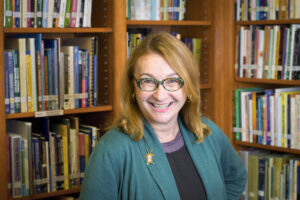 “If you sit in enough badly-run meetings,” says Joan Francuz, who worked in the software industry for more than 30 years, “you do start to wonder if people have always behaved like this, so the idea of going back in time has been percolating for a number of years.”
“If you sit in enough badly-run meetings,” says Joan Francuz, who worked in the software industry for more than 30 years, “you do start to wonder if people have always behaved like this, so the idea of going back in time has been percolating for a number of years.”
And it was percolating when she saw an ad in The Walrus magazine for the University of King’s College MFA in Creative Nonfiction program in the spring of 2014. “We’ve got your book,” the ad proclaimed.
Francuz says she decided to apply “on a whim.”
While all her mentors were helpful, Francuz says it was Kim Pittaway, now the executive director of the MFA program, “who said that I was funny. No one had ever told me that before, so I got the notion that my book of history could amuse people. I have heard that people laugh out loud when they read my book, so perhaps Kim was right.”
Press Enter to Continue: Scribes from Babylon to Silicon tells “the story of people who wrote ‘how-to’ books,” Francuz explains. “Writers have always explained how to do things — whether it’s how to live a good life, wage war, behave in polite society, patent a steam engine, or run a factory. Press Enter to Continue tells their stories, plus mine as a technical writer in the modern age.”
Francuz says the decision to self-publish the book was easy. “I didn’t want to spend my time waiting for someone who probably wouldn’t even reply to my proposal. I just wanted my book available on Amazon, so I decided to publish it myself.”
Since she’s worked in technology, she says the process “wasn’t that daunting.” But she did hire professionals, including a designer for the cover and an editor to go over the finished manuscript. “I have written and edited for years, and I thought my manuscript was pretty good, but I still hired an editor. She proved to be worth her fee by flagging a few phrases that I liked to use a lot.”
While Francuz says her sales goals for the book are modest, she has begun to schedule library readings and is “experimenting with Amazon’s advertising products. It’s still early days.”
And she is already — “of course” — thinking about her next book. “It will be something about the public loss of trust in science, in spite of all those science centres and science writers and science courses trying to convince people to believe the men and women in white coats. One thing I don’t have to worry about is how I’m going to publish it.”

